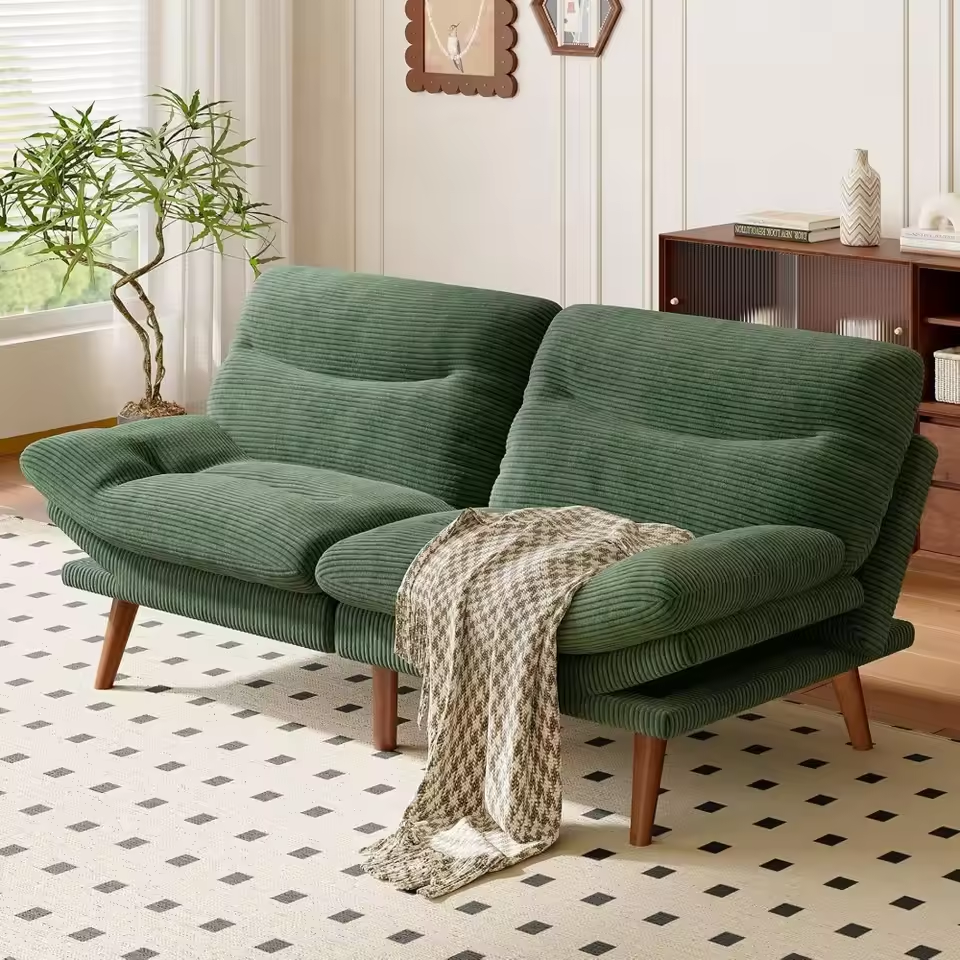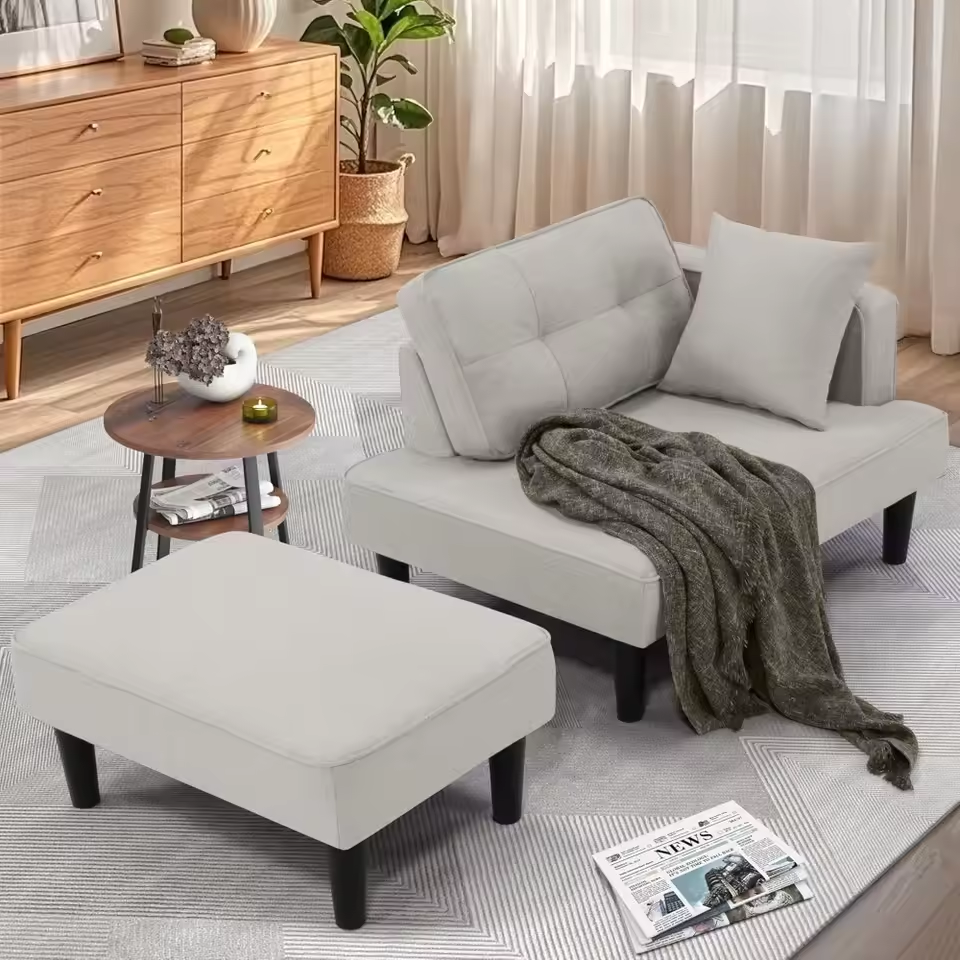What Is a Sofa Bed?
A sofa bed futon is a versatile piece of furniture. It functions as both a couch and a bed. Sofa beds are great for saving space. They are ideal for homes with limited rooms or for hosting guests. This multi-functional furniture is designed to provide comfort during the day and night.
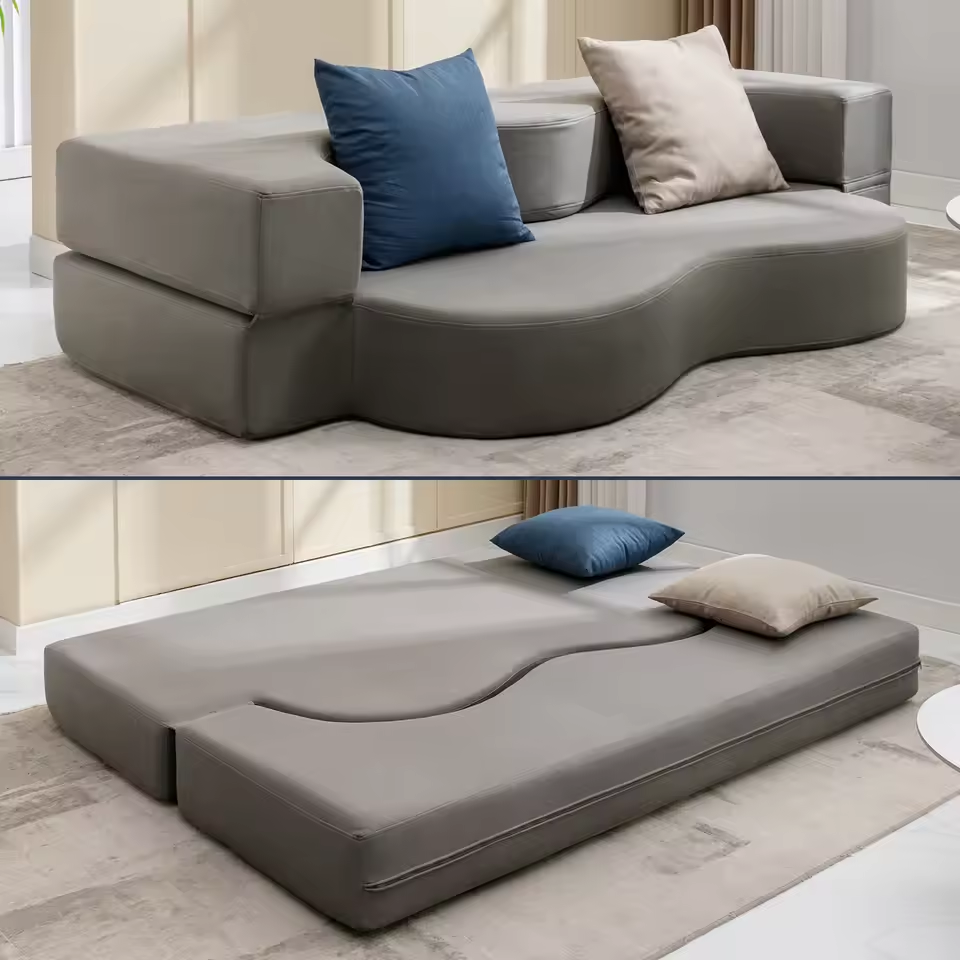
Features of a Sofa Bed
- Dual Functionality: Sofa beds serve as seating furniture and convert into a bed.
- Space-Saving Design: They are practical for small homes or apartments.
- Built-In Mattress: Many come with mattresses that unfold easily within the frame.
- Durable Frames: Frames are often crafted from metal or solid wood for strength.
- Ease of Conversion: Simple mechanisms allow swift transformation.
Common Materials Used in Sofa Beds
- Upholstery Fabrics: Cotton, polyester, or microfiber are common. These are durable and easy to clean.
- Foam or Memory Foam Mattresses: Offer varying levels of comfort and support.
- Metal Frames: Provide stability and support for frequent use.
- Wooden Frames: Add aesthetic appeal and sturdiness.
- Leather Covers: Ideal for a stylish, upscale look but can be costlier.
Popular Styles and Designs
- Traditional Sofa Beds: Resemble regular sofas with a hidden pull-out bed.
- Modern Convertible Sofas: Include sleek designs with simple mechanisms.
- Sectional Sofa Beds: Combine spacious seating with a sleeping option.
- Loveseat Sofa Beds: Perfect for compact spaces or single sleepers.
- Futon-Style Sofa Beds: A minimalist design that transitions easily to a bed.
Sofa beds offer convenience and functionality, making them a favorite choice for many households. They seamlessly blend comfort, style, and practicality for everyday use.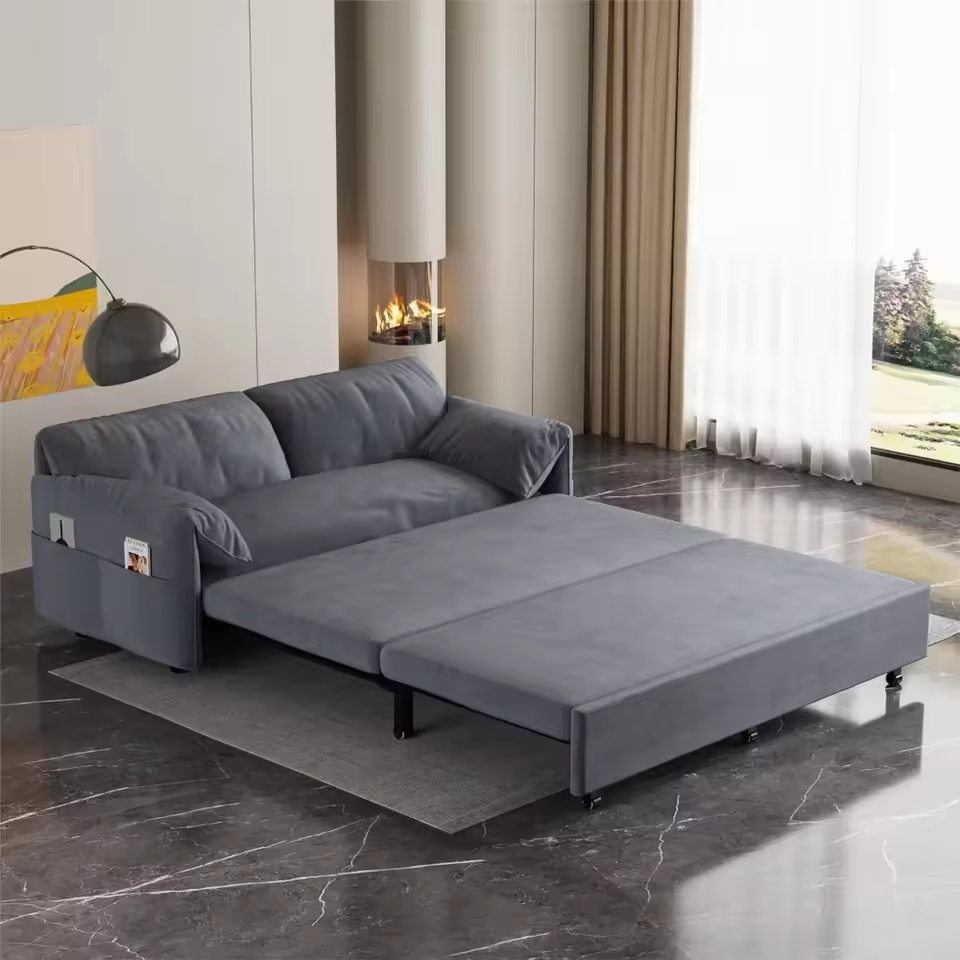
What Is a Futon?
A futon is a compact and flexible piece of furniture. It is widely used in small spaces or multi-functional rooms. Futons can function both as seating and sleeping furniture. Unlike traditional sofas, they usually fold flat to create a sleeping area. Known for their minimalistic design, futons are a popular choice due to their simplicity and adaptability.
Features of a Futon
- Convertible Design: Easily transitions from a sofa to a bed by flattening the frame.
- Space Efficiency: Takes up less room compared to standard sofa beds.
- Lightweight Build: Easier to move and rearrange than bulkier furniture.
- Minimal Mechanisms: Generally features simple hinges, making it easy to operate.
- Customizable Options: Allows swapping of mattresses and covers for different styles or firmness levels.
Common Materials Used in Futons
- Wooden Frames: Common for their strength and natural aesthetic.
- Metal Frames: Durable, lightweight, and often used in modern designs.
- Cotton or Foam-Filled Mattresses: Provide basic comfort and are lightweight for easy handling.
- Memory Foam Mattresses: Offer better support and comfort levels than traditional options.
- Removable Covers: Typically made of cotton, polyester, or microfiber for easy cleaning and maintenance.
Popular Styles and Designs
- Traditional Japanese Futons: Lay directly on the floor without a frame.
- Bi-Fold Futons: Fold once horizontally to create a sofa or bed.
- Tri-Fold Futons: Fold twice to offer more seating or sleeping configurations.
- Armless Futons: Provide a sleek, minimalistic look and are great for saving space.
- Futon Bunk Beds: Combine a sleeping surface with an additional loft or bunk feature for kids’ rooms.
Futons are practical for both simplicity and functionality. They work well in any space requiring multi-purpose furniture.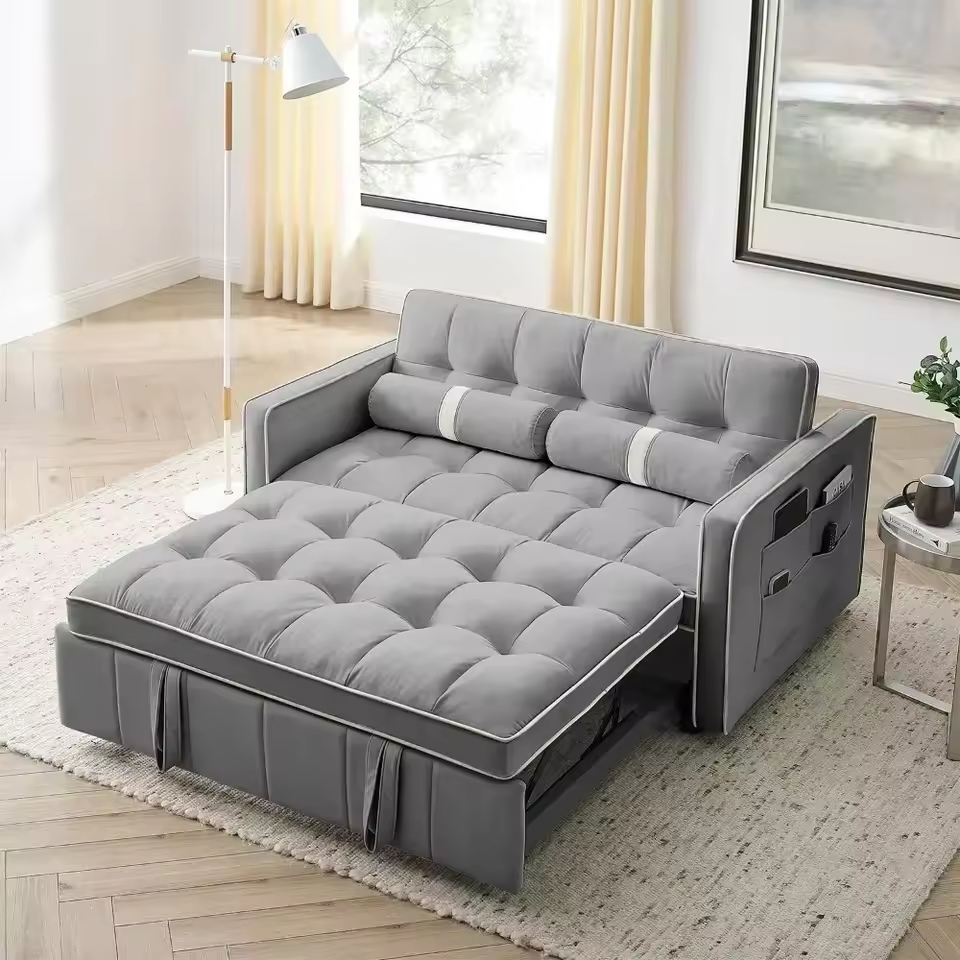
Key Differences Between Sofa Bed Futon
Design and Functionality
Sofa beds and futons differ significantly in design and functionality. Sofa beds resemble traditional sofas with an inbuilt mechanism to transform into a bed. Futons, on the other hand, are simpler and rest on frames that fold flat for sleeping. Sofa beds often come in stylish designs that match living room décor. Futons focus on minimalism, making them ideal for spaces seeking a clean, uncomplicated look.
Comfort and Support
Comfort levels vary between sofa beds and futons. Sofa beds usually include a built-in mattress, offering more support and cushioning. Futons use mattresses that may not provide the same level of comfort, especially for long durations. While sofa beds excel at sustained comfort, futons are suitable for short-term use or when flexibility matters more.
Space and Size Considerations
Sofa beds are bulkier and take up more space, making them ideal for larger rooms. Futons are lightweight and compact, making them perfect for apartments and small areas. Sofa beds offer a more roomy seating with thicker cushions, while futons are streamlined and easy to move around.
Assembly and Conversion Process
Sofa beds often involve complex mechanisms for conversion and assembly, but they are user-friendly for most homeowners. Futons use basic hinges for quick and easy folding, appealing to those who prioritize simplicity. Converting a sofa bed to a sleeping option may take a few steps, while futons usually flatten down in just one motion.
Pros and Cons of Sofa Beds
Sofa beds are highly versatile, combining style and practicality in one piece of furniture. However, they have their own set of advantages and disadvantages. If you’re considering a sofa bed, weigh the pros and cons to ensure it’s the right choice for your needs.
Advantages of Sofa Beds
- Space Efficiency: Ideal for small homes or apartments, as they serve two purposes in one.
- Versatility: Functions as both a sofa and a bed, making them perfect for hosting guests.
- Comfortable Options: Built-in mattresses provide decent comfort for sleeping and sitting.
- Stylish Designs: Available in a variety of styles and materials to match your home decor.
- Durability: Metal or wooden frames ensure long-lasting use even with frequent conversions.
- Easy Conversion: Modern designs feature simple mechanisms to quickly switch between sofa and bed.
Disadvantages of Sofa Beds
- High Cost: Sofa beds are generally more expensive than standard futons or sofas.
- Weight and Bulk: Heavier and harder to move compared to lightweight futons.
- Limited Mattress Choices: Usually come with fixed mattresses, which may not suit all preferences.
- Complex Assembly: Some models require more effort to assemble or convert.
- Space Demand: Require more floor area when fully unfolded into a bed.
- Maintenance Challenges: Cleaning and maintaining built-in mattresses and upholstery can be tedious.
Sofa beds are a great choice for versatility and style, but they may not suit all spaces or budgets. Carefully consider these factors before making your decision.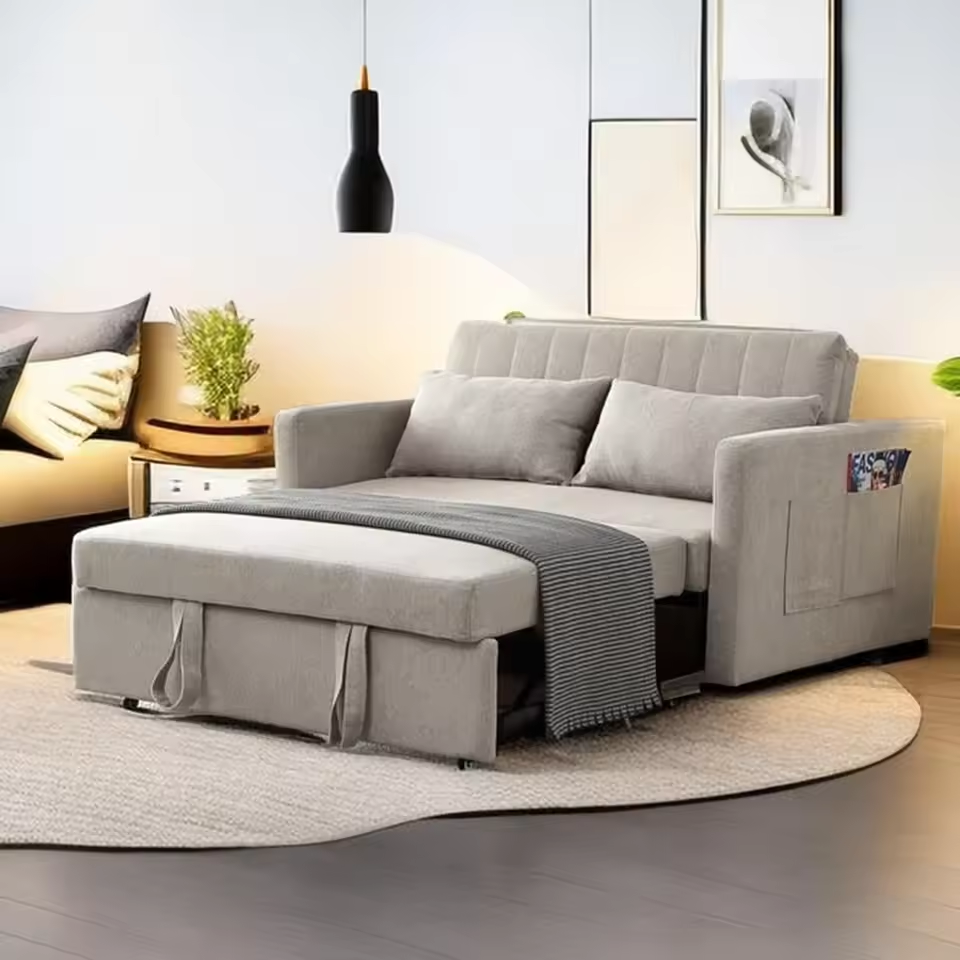
Pros and Cons of Futons
Futons are practical, lightweight, and versatile furniture. However, like sofa beds, they have advantages and drawbacks. Considering these pros and cons can help you decide if a futon suits your needs.
Advantages of Futons
- Affordable Pricing: Futons are usually more budget-friendly compared to sofa beds.
- Lightweight and Portable: Easily moved, making them perfect for rearranging spaces.
- Compact Design: Ideal for small apartments or multi-functional rooms.
- Quick Conversion: Transitioning between sofa and bed is simple and fast.
- Customizable Options: You can change mattresses and covers for style or comfort.
- Minimalistic Aesthetic: Offers a clean, modern look that works well in various décor styles.
- Multi-Purpose Functionality: Great for both seating and sleeping in limited spaces.
Disadvantages of Futons
- Less Comfort for Long-Term Use: Basic mattresses may not provide enough support for extended periods.
- Lower Durability: Frames and mattresses may wear out faster with frequent use.
- Simplistic Design: May lack the elegance and style of traditional sofa beds.
- Limited Mattress Thickness: Typically thinner, offering less plushness than a sofa bed mattress.
- Not Ideal for Heavy Weight: Lightweight frames may not support heavy usage or extra weight.
- Requires Manual Adjustment: Folding or unfolding can be cumbersome for some users.
Consider the advantages and disadvantages before deciding on a futon. They work best in spaces where simplicity, portability, and cost-effectiveness are priorities.
Which One Is Right for You?
Choosing between a sofa bed futon depends on your specific needs. Factors like space, comfort, and budget play important roles. Below, find key considerations to help you decide.
Factors to Consider Before Buying
- Available Space: Measure your space before deciding. Sofa beds suit larger rooms, while futons fit small spaces.
- Comfort Needs: Sofa beds offer built-in mattresses, providing more cushioning. Futons often have thinner mattresses.
- Frequency of Use: Regular sleepers might prefer the durability and support of sofa beds. Futons work for occasional use.
- Style Preference: Sofa beds match sophisticated designs, whereas futons suit minimalistic and modern styles.
- Budget: Evaluate your budget. Futons are affordable, while sofa beds tend to be pricier.
- Ease of Use: Sofa beds may involve complex mechanisms. Futons are simple and quick to adjust.
Best Options for Small Spaces
If space is limited, a futon is usually the best choice.
- Compact Design: Futons take up less room and are highly adaptable for small apartments.
- Lightweight: Their lighter build makes them easier to move and arrange.
- Customizability: Change futon mattresses or covers to match a changing décor.
However, loveseat sofa beds can also fit well in small spaces. They allow practical use of limited areas with added elegance.
Ideal Choices for Guest Rooms or Daily Use
For guest rooms, sofa beds often provide better comfort and support:
- Enhanced Support: Built-in mattresses in sofa beds cater to overnight guests.
- Dual Functionality: Offers stylish daytime seating and a comfortable bed at night.
If you need daily-use furniture, choose based on usage frequency:
- Sofa Beds: Ideal for frequent use due to their durability and comfort.
- Futons: Work best for occasional use or temporary seating and sleeping solutions.
Carefully consider your priorities before making a choice. Both sofa beds and futons can serve you well in the right setting.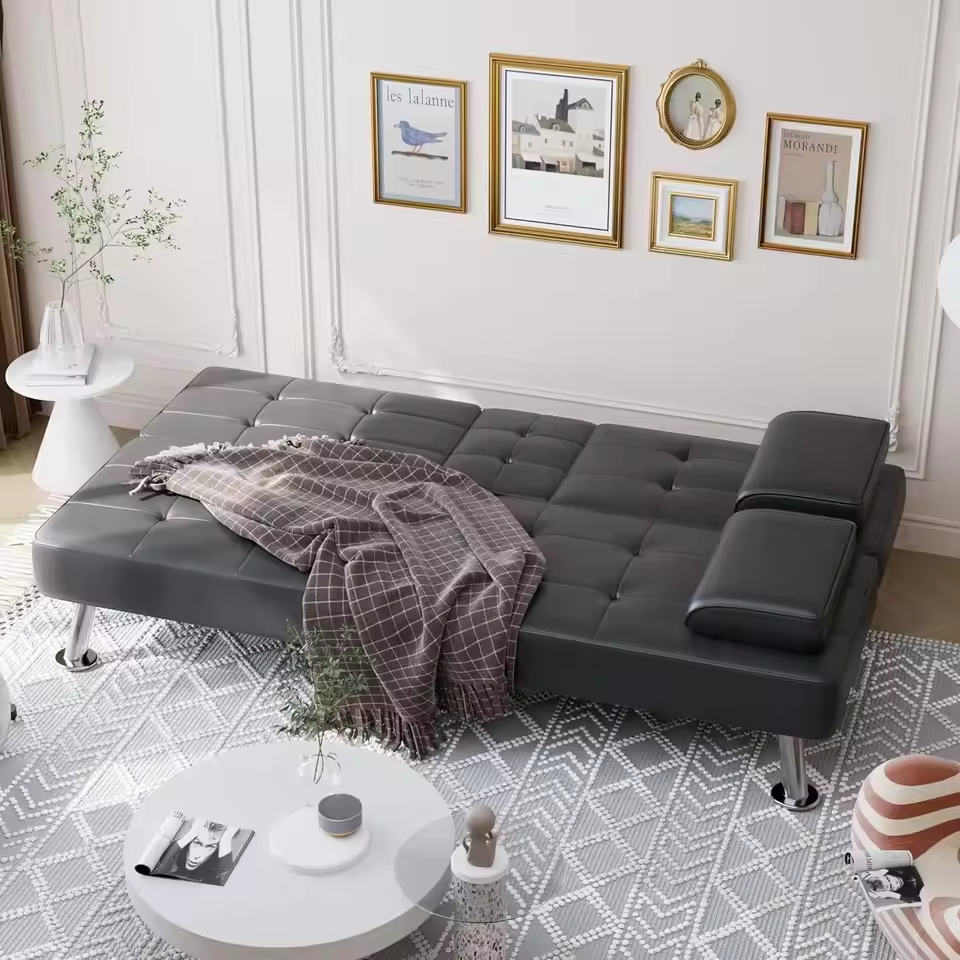
Maintenance and Care Tips
Proper maintenance can extend the lifespan of your furniture. Whether you own a sofa bed futon, regular cleaning and care are essential. Below are practical tips for keeping your investment in great condition.
Cleaning and Maintaining a Sofa Bed
- Vacuum Upholstery Regularly: Clean the sofa bed’s fabric to remove dust and debris.
- Spot Clean Stains: Use fabric-appropriate cleaners for quick stain removal.
- Rotate the Mattress: Flip and rotate the mattress every few months to prevent uneven wear.
- Check the Mechanisms: Lubricate moving parts like hinges to ensure smooth operation.
- Protect with Covers: Use slipcovers to shield upholstery from dirt and potential damage.
- Air Out the Mattress: Occasionally open the sofa bed and let the mattress breathe to prevent odors.
Cleaning and Maintaining a Futon
- Vacuum the Mattress: Remove dust and allergens from the futon’s surface regularly.
- Machine-Wash Removable Covers: Clean the washable covers according to fabric care instructions.
- Sun-Dry the Mattress: Place the mattress under sunlight occasionally to remove moisture and odors.
- Tighten the Frame: Check for loose screws or bolts and tighten as necessary.
- Spot Clean Stains: Use mild detergent for stain removal without damaging the material.
- Rotate the Mattress: Ensure even wear by flipping the futon mattress regularly.
Regular maintenance not only enhances usability but also keeps your sofa bed futon looking fresh. Take simple steps to protect your furniture and ensure longevity.
